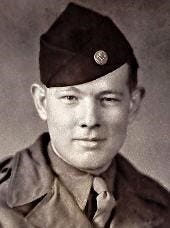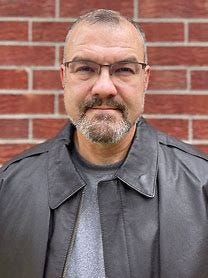Duane Richter, of Thermopolis, Wyoming, wrote to the 90th Infantry Division newsletter in the 1980s and asked if anybody remembered his father, Captain James Richter, who was killed in World War II. He received 80 responses, including one from a veteran who was on the phone with Captain Richter, a forward artillery observer, when he uttered his last words: “Excuse me, I have to duck.”
Kaye Ackermann, of Charlotte, North Carolina, was told by her mother never to ask her father about the war. When it was too late to ask him, Kaye took tank driving lessons, retraced her tank commander father’s combat journey through Europe, and has since become a highly skilled and sought after researcher.
It was my own quest to learn about my father’s experiences that turned me into an oral historian.
I skimmed through the introduction of “Bombing Hitler’s Hometown,” by Mike Croissant, so when I came across the name Ellsworth Croissant in one of the many B-17 and B-24 crews profiled in what was the last major bombing raid of World War II, I assumed the author grew up with his father’s stories and that got him into researching the April 25, 1945 raid on Linz, Austria. And because Ellsworth survived the mission, it came as a shock when, a few days after returning home, he went on a simple flight to record some time in the air to receive his flight pay — sort of a bonus for air crews that completed their required missions — and was killed when the plane crashed. Only then did I go back and learn that Ellsworth Croissant was the author’s uncle.
I’m glad I didn’t know that earlier because after being taken inside one crippled aircraft after another, and another, and yet another; on multiple trips via parachute to earth; absorbing stories of beatings and abuse at the hands of civilians, of flyers being shot at from the ground, and in at least one case killed; of the atrocities committed by our Russian allies, and of air crews thrown into the most notorious concentration camp in Austria, when the battle was finally over and the survivors almost through with their ordeal, I was like, okay, now the relentless action will ease up and I’ll get a few chapters about Ellsworth’s life after the war. Boy, was I wrong.
“Bombing Hitler’s Hometown” by retired CIA analyst Mike Croissant, resonated with me on a number of levels. Not because the author described the grandiose plans the fuhrer had for transforming his birthplace into one of the art capitals of the world, or because Linz was a major Austrian industrial and rail center. Not even because it highlights the accomplishments of the 15th Air Force, which has long been overshadowed in history by the 8th Air Force.
It resonated with me first, because it is a masterpiece of oral history. I assumed the author must have attended multiple reunions to get so many vivid accounts of what went on in so many of the hundreds of bombers that flew into the buzzsaw of one of the heaviest concentrations of flak in the war. As it turns out, though, he didn’t go to any reunions. Once he became obsessed with his uncle’s mission, he began interviewing survivors; he met family members and American and Austrian historians, pored through records and war crimes trial transcripts, planted himself at the National Archives, and had access to books, memoirs, diaries and letters. Hell, the 45 pages of notes at the end read almost like a book in themselves: (Page 74 - “today their judgment was off,” Audio tape, Rodger the Lodger crew reunion, September 1988; Page 78, “Hell can’t be any worse than that,” quoted in [Stephen] Ambrose, The Wild Blue, page 241; Page 84 - “He could hear but not transmit,” John Greenman, “Shot down over Linz,” unpublished account.
It resonated with me second because instead of following one plane or crew at a time from start to finish, the same airman would appear in different chapters, once, for example, in a chapter about the briefing; later in a chapter about the scene inside his plane; again in a chapter about men who were captured; and later about his time in Russia. As well, Croissant provides snippets of information about the backgrounds and upbringing of many of the flyers.
It resonated third because each chapter heading was a quote from one of the people in the book. As an old newspaper headline writer, I know how powerful a quote can be, and every chapter heading is powerful: Chapter 5: “I Knew That I was Going to Die.” Chapter 9: “We’re Running Out of Sky.” Chapter 14: “For You, Too, a Mother Weeps.”
And it resonated fourth because of its parallels and contrasts to the Kassel Mission, a spectacular air battle that has captivated my own interest. The Kassel mission was a tragic failure, 25 bombers shot down after flying off course and missing their target. The Linz raid was a spectacular success, but against a foe whose defeat was a foregone conclusion. The Kassel raid pitted bombers against fighters, mano a mano. The Luftwaffe was all but kaput two weeks before VE Day, but the antiaircraft gunners may have thought the war was ending because it seemed they said let’s use up the rest of our ammunition as they put up a virtually impenetrable gauntlet of flak.
The Kassel Mission had a celebrity in Jimmy Stewart, who took part in debriefing the handful of crews that returned to the 445th Bomb Group’s base. The Linz raid had two future celebrities; George McGovern, who would one day run for president, and Norman Lear, whose iconic television sit-coms would include All in the Family, Maude, The Jeffersons, and Sanford & Son.
One thing which struck me was that many flyers on the Linz raid had their pistols with them, and were careful to turn them over without reaching for them when they were captured. Many of the Kassel Mission participants who became prisoners of war were told to leave their weapons behind because captured airmen were being shot with their own pistols.
Just about any airman who took part in the April 25, 1945 raid could have written a book, especially considering the narrow scrapes many of them had on earlier missions. Some of them did write a book, many didn’t, and would have taken their stories to the grave were it not for an inquisitive son or daughter, nephew or grandchild
. Dale Shebilsky
One of those who did pen a memoir was Dale Shebilsky, one of the author’s many sources for the stories in Bombing Hitler’s Homeland. Shebilsky’s obituary appeared in the Arizona Republic:
Shebilsky, Dale Louis of Mesa, Arizona passed away in his sleep on July 19, 2014. He was 89. Dale served in the Army Air Corps in WWII as part of a B-24 bomber crew. His plane was shot down and crashed in Hungary where he contacted a Russian unit that mistook him for a German and imprisoned him in a POW camp with German soldiers. The Russians tortured him for German information, and once he finally convinced them he was an American, they tortured him for American information. He was released after V.E. Day and reunited with his family. His decorations included the Air Medal and Purple Heart.
When I was at the Bergen Record in New Jersey, I interviewed a woman who self-published a book about her church. She said she considered it a success when a parishioner told her, “It made me laugh. It made me cry.”
I laughed once in Bombing Hitler’s Hometown, at the antics of the Russian soldiers and officials who drank vodka until they were soused and made their American captives drink until they were inebriated as well, and who casually smoked while fueling up an airplane. And I cried once as well when, I guessed wrong about what was about to happen. Captain Glenn Hess, a B-24 pilot who lived in California, noticed a motor home whose driver appeared to be lost. He pulled up behind the motor home to offer directions, and I assumed he was about to encounter another flier from the April 25 mission, as such a serendipitous occurrence had occurred in one my own interviews.
Instead, the motor home’s occupants were an elderly couple from Linz, and the wife had a big scar above her lip that she told Hess she got when she was a six month old baby in her crib and the city was bombed on April 25, 1945.
Now more than ever, as a 712th Tank Battalion veteran wrote to the battalion’s newsletter shortly before dying of cancer, “time is succeeding where Hitler failed.” I don’t know if Duane Richter ever did anything with the several inch thick looseleaf binder he compiled. Kaye Ackermann and another veteran’s daughter are writing a book about a popular veteran of the 90th Division, and Kaye has gone to great lengths to ensure that the legacy of Rolland Ackermann will not be lost to time. Facebook has multiple groups with thousands of so-called next-gens making sure that great-grandchildren and grand nephews and nieces who know only that their relative was in World War II can find out all about the places he was stationed and the battles he was in. Bombing Hitler’s Hometown serves that purpose for descendants of the often overlooked airmen in bomb groups that participated in one of the most dramatic bombing raids of World War II.
Mike Croissant
P.S. I would be remiss if I didn’t mention that the bombing of Linz brought back a memory from early in my newspaper career, when I was an overnight copy editor in the sports department of the New York Post in the early 1970s. Every night at 3:30 or 4 in the morning the Linotype machines would go silent and their operators would congregate in a room called the chapel and catch a few winks or play cards. A cart would be wheeled in at which you could order coffee and what would become one of my favorite desserts, those big round powdered sugar topped crumbly cookies with a splash of raspberry jam in the middle called Linzer tarts. They might have cost fifty cents, if memory serves me correctly.





When I called the Linz raid the last great bombing raid, I should have added "in the European theater." The war was still ongoing in the Pacific, after all!
Here are a few good titles for Women's History Month: Valiant Women: The Extraordinary American Servicewomen Who Helped Win World War II, We Band of Angles, and The Secret Rescue. I've included in my books on the Pacific interviews with Army and Navy women POWs. I included the women voluntary spies who were caught and tortured in the Pacific and interviewed by Diane Fessler. I did interview and publish several South Pacific Islanders when I was there several years ago. They were civilian POWs and tortured during the war.